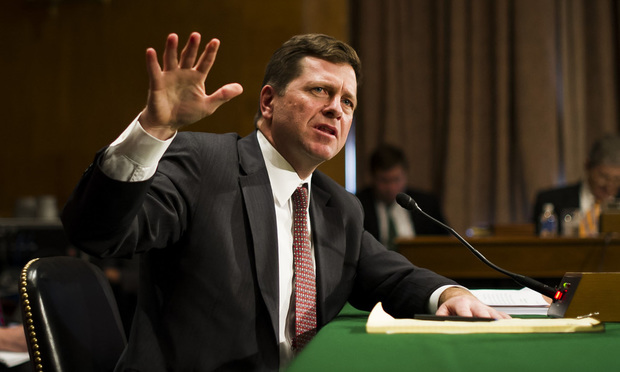SEC Chair Jay Clayton's Haul From Sullivan & Cromwell Inches Up (Another $1.7M)
Clayton's latest financial disclosure, which had been available in December, was released Monday on the reopening of the federal government.
January 28, 2019 at 06:56 PM
6 minute read
 Jay Clayton testifies in March at his confirmation hearing. (Photo: Diego M. Radzinschi/ ALM)
Jay Clayton testifies in March at his confirmation hearing. (Photo: Diego M. Radzinschi/ ALM)
As the Trump administration's pick to lead the U.S. Securities and Exchange Commission, Jay Clayton stood out as one of the wealthiest nominees when he reported $7.6 million in partnership income from the law firm Sullivan & Cromwell, where he represented an array of prominent companies and Wall Street banks.
But that eye-popping figure, which included income for legal services provided in the 12 months preceding his nomination, did not capture everything Clayton made in his final full year as a Sullivan & Cromwell partner. In 2017, Clayton received an additional $1.7 million, according to a newly released annual financial disclosure.
The income fits the overall portrait of compensation schemes at Sullivan & Cromwell, one of the wealthiest Wall Street firms. Sullivan & Cromwell ranked fifth last year in The American Lawyer ranking of Am Law 100 firms by profits per equity partner. The firm's profits per equity partner in 2017 were identified as $4.2 million.
Clayton was nominated in January 2017 to lead the SEC, but he didn't leave the firm until his confirmation that May. He had been a partner at the New York-based firm since 2001. Clayton's latest financial disclosure, which had been available in December, was released Monday on the reopening of the federal government.
Clayton said in the disclosure: “Pursuant to the firm's partnership agreement, and before I assumed the duties of the position of SEC chairman, I received a refund of my capital account and a pro rata partnership share based on the value of my partnership interests for services performed in 2017.”
A source familiar with Clayton's compensation said the newly reported earnings stemmed from work completed in 2016 and that his practice at Sullivan & Cromwell was effectively dormant in early 2017 after the White House announced his nomination.
In his first financial disclosure, filed in January 2017 after he was nominated to lead the SEC, Clayton revealed an elite client list that included Deutsche Bank, Goldman Sachs, Volkswagen, The Weinstein Co. and LinkedIn co-founder Reid Hoffman. (The disclosure also noted nine clients—four individuals and five corporations—whose identities were kept confidential.)
Publicly available ethics documents indicated that Clayton, as of July 2017, had recused from particular matters at the SEC involving a personal or imputed financial interest. Clayton also said in an ethics filing that he had recused from particular matters that involved Sullivan & Cromwell and former clients.
Clayton's deep white-collar ties, combined with his past questioning of the fairness of corporate penalties, raised questions during his confirmation proceedings about how aggressively the SEC would police markets under his watch.
 U.S. Securities and Exchange Commission building in Washington, D.C. (Photo: Mike Scarcella / ALM)
U.S. Securities and Exchange Commission building in Washington, D.C. (Photo: Mike Scarcella / ALM)In November, a review by the New York Times showed a decline in the SEC's enforcement activity during the first 20 months of the Trump administration. Comparing that period to the final 20 months of the Obama presidency, the Times concluded that the disgorgement and financial penalties ordered by the SEC fell by 62 percent.
The SEC disputed the report's methodology as “deeply flawed.” “As the thorough analysis in our annual report makes clear, the division of enforcement's performance, effectiveness and activity level during our tenure compares favorably with any period in the commission's history,” the SEC's enforcement directors said.
The law firm Gibson, Dunn & Crutcher, long a big player in the white-collar space, said in a report this month that the SEC's enforcement activity rebounded in the fiscal year that ended Sept. 30, 2018, with the agency filing 490 new actions. The SEC had filed 446 stand-alone enforcement actions in the fiscal year that ended in September 2017, a more than 18 percent drop from the nearly 550 actions filed in the previous fiscal year. “The (fiscal) year-end rush appeared intended to blunt some of the criticism of the Enforcement Division's productivity in the new administration,” the report concluded.
Under Clayton's leadership, the enforcement division has prioritized cases involving so-called “Main Street” or “retail” investors while also keeping watch over a relatively new front: the digital currency market. At the end of 2018, the SEC brought a string of cases over unregistered initial coin offerings, or ICOs, and reached settlements with the professional boxer Floyd Mayweather and DJ Khaled over allegations that they promoted coin offerings without disclosing that they had been paid to do so.
In congressional testimony and public remarks, Clayton has also stressed the SEC's efforts with cybersecurity—including guidance the agency has issued for disclosing cyber incidents.
Last year, the SEC charged a former top executive at Equifax with selling off shares in the company based on inside information about a breach that exposed the personal information of nearly 150 million Americans. And earlier this month, the SEC charged a Ukrainian hacker and six traders with accessing the agency's EDGAR system for regulatory filings to obtain nonpublic information and trade on it.
Read more:
What 11 Ex-Big Law Partners' Financial Disclosures Revealed in 2018
FBI Director Wray Banked $14M From King & Spalding Since 2016
Clayton, SEC Chair Nominee, Pulled in $7M From Sullivan & Cromwell
Trump Lawyer Emmet Flood's Financial Disclosure Shows $3.3M Partner Share
Former Allen & Overy Partner Gets Trump Nod to Lead Commodities Agency
This content has been archived. It is available through our partners, LexisNexis® and Bloomberg Law.
To view this content, please continue to their sites.
Not a Lexis Subscriber?
Subscribe Now
Not a Bloomberg Law Subscriber?
Subscribe Now
NOT FOR REPRINT
© 2025 ALM Global, LLC, All Rights Reserved. Request academic re-use from www.copyright.com. All other uses, submit a request to [email protected]. For more information visit Asset & Logo Licensing.
You Might Like
View All
Legal Departments Dinged for Acquiescing to Rate Hikes That 'Defy Gravity'
4 minute read
Arnold & Porter Matches Market Year-End Bonus, Requires Billable Threshold for Special Bonuses
3 minute read
'So Many Firms' Have Yet to Announce Associate Bonuses, Underlining Big Law's Uneven Approach
5 minute read
Topping Big Law, Litigation Firm the Latest to Dole Out Above-Market Bonuses
3 minute readTrending Stories
- 1Midsize Firm Bressler Amery Absorbs Austin Boutique, Gaining Four Lawyers
- 2Bill Would Allow Californians to Sue Big Oil for Climate-Linked Wildfires, Floods
- 3LinkedIn Suit Says Millions of Profiles Scraped by Singapore Firm’s Fake Accounts
- 4Supreme Court Agrees to Hear Lawsuit Over FBI Raid at Wrong House
- 5What It Takes to Connect With Millennial Jurors
Who Got The Work
J. Brugh Lower of Gibbons has entered an appearance for industrial equipment supplier Devco Corporation in a pending trademark infringement lawsuit. The suit, accusing the defendant of selling knock-off Graco products, was filed Dec. 18 in New Jersey District Court by Rivkin Radler on behalf of Graco Inc. and Graco Minnesota. The case, assigned to U.S. District Judge Zahid N. Quraishi, is 3:24-cv-11294, Graco Inc. et al v. Devco Corporation.
Who Got The Work
Rebecca Maller-Stein and Kent A. Yalowitz of Arnold & Porter Kaye Scholer have entered their appearances for Hanaco Venture Capital and its executives, Lior Prosor and David Frankel, in a pending securities lawsuit. The action, filed on Dec. 24 in New York Southern District Court by Zell, Aron & Co. on behalf of Goldeneye Advisors, accuses the defendants of negligently and fraudulently managing the plaintiff's $1 million investment. The case, assigned to U.S. District Judge Vernon S. Broderick, is 1:24-cv-09918, Goldeneye Advisors, LLC v. Hanaco Venture Capital, Ltd. et al.
Who Got The Work
Attorneys from A&O Shearman has stepped in as defense counsel for Toronto-Dominion Bank and other defendants in a pending securities class action. The suit, filed Dec. 11 in New York Southern District Court by Bleichmar Fonti & Auld, accuses the defendants of concealing the bank's 'pervasive' deficiencies in regards to its compliance with the Bank Secrecy Act and the quality of its anti-money laundering controls. The case, assigned to U.S. District Judge Arun Subramanian, is 1:24-cv-09445, Gonzalez v. The Toronto-Dominion Bank et al.
Who Got The Work
Crown Castle International, a Pennsylvania company providing shared communications infrastructure, has turned to Luke D. Wolf of Gordon Rees Scully Mansukhani to fend off a pending breach-of-contract lawsuit. The court action, filed Nov. 25 in Michigan Eastern District Court by Hooper Hathaway PC on behalf of The Town Residences LLC, accuses Crown Castle of failing to transfer approximately $30,000 in utility payments from T-Mobile in breach of a roof-top lease and assignment agreement. The case, assigned to U.S. District Judge Susan K. Declercq, is 2:24-cv-13131, The Town Residences LLC v. T-Mobile US, Inc. et al.
Who Got The Work
Wilfred P. Coronato and Daniel M. Schwartz of McCarter & English have stepped in as defense counsel to Electrolux Home Products Inc. in a pending product liability lawsuit. The court action, filed Nov. 26 in New York Eastern District Court by Poulos Lopiccolo PC and Nagel Rice LLP on behalf of David Stern, alleges that the defendant's refrigerators’ drawers and shelving repeatedly break and fall apart within months after purchase. The case, assigned to U.S. District Judge Joan M. Azrack, is 2:24-cv-08204, Stern v. Electrolux Home Products, Inc.
Featured Firms
Law Offices of Gary Martin Hays & Associates, P.C.
(470) 294-1674
Law Offices of Mark E. Salomone
(857) 444-6468
Smith & Hassler
(713) 739-1250








